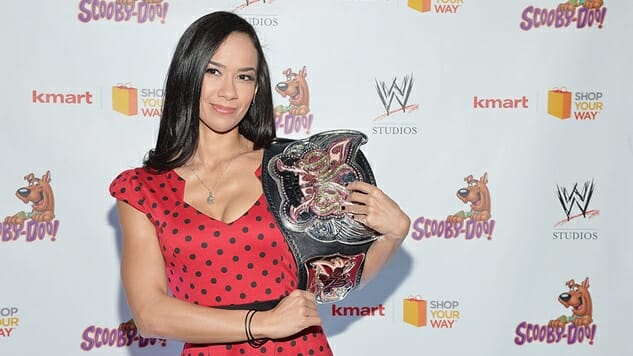Former WWE Superstar AJ Mendez Brooks Talks Honesty on Social Media, Spooning Her Mini-NES and Her New Book
Photo by Mike Coppola/Getty
From a fiercely independent spirit that separated her from the top of the social food chain throughout her life, to an early diagnosis of bipolar disorder, AJ Mendez Brooks’ ability to embrace her uniqueness and stay true to herself has made her a hero and a social media sensation. Paste chatted with the former WWE Women’s Champion about being open with her fans, her book, Crazy is My Superpower, and embracing her geek side.
Paste: Your social media following is huge and rabid, despite the fact that you haven’t been on TV regularly in some time. What’s your secret?
AJ Mendez Brooks: I think the fans that have been there from the very beginning connected to me before I was even on TV, supported me throughout, have come along for my journey after and ultimately just spread the word. I can only guess it’s grown exponentially because people connect to my authenticity and enjoy my ridiculous sense of humor. If I could formulate an exact reason, I would bottle whatever it is and sell it to aspiring YouTube stars.
Paste: Have you been big into social media throughout your life as a public figure?
Brooks: I’m a fiercely private person, so all of the social media accounts I have were originally created as simple extensions of the work I’m doing. But from a young age I desperately tried to find like-minded people to gush about Dragonball Z or Final Fantasy or whatever I was obsessed with, and it was always a struggle. I’ve come to find the fun and value in social media is that it’s easy to find the warm embrace of a fandom. I’m not great at sharing selfies or my gym schedule, but I can tweet about the teaser for the new Red Dead game making me cry and instantly feel understood. I also try not to take the platform I have for granted. Come for the jokes about spooning my mini-NES, stay for the public policy reform.
Paste: Are you good at embracing the positivity that comes from fans through social media without also taking the inevitable bad feedback and trolling to heart?
Brooks: If you read and believe the good things you must also read and believe the bad. So I tend to stay out of those particular murky waters. You don’t have to go looking for positivity, it has a way of finding you.
Paste: This book feels like a major turning point for you, as it seems like you’ve transitioned from someone teens can identify with to someone they can also learn from. Do you feel like you’ve evolved into sort of a mentor for your fans?
Brooks: I think it’s important to be a responsible role model in this day and age, and to do that you have to be honest about the mistakes you’ve made. I’m really lucky to have formed these bonds and connections over our shared interests of videogames, comic books, and comfortable clothing, because now there is a trust involved when I get serious about animal welfare, misogyny, or mental health. I hope they’ll trust the ride my upcoming book takes them on, learn from my mistakes and experiences, and most importantly feel less alone because of it.
-

-

-

-

-

-

-

-

-

-

-

-

-

-

-

-

-

-

-

-

-

-

-

-

-

-

-

-

-

-

-

-

-

-

-

-

-

-

-

-








































